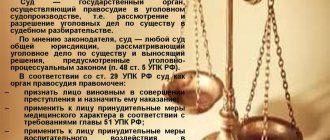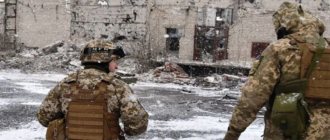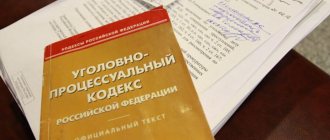The adversarial nature of the parties in criminal proceedings is the main idea on the basis of which both the investigation and the legal proceedings should be carried out.
Chapter 2 of the Criminal Procedure Code of the Russian Federation defines a list of principles on which to rely. However, the principle in question is considered key, since it determines the essence of the investigation of the case at the preliminary and judicial stages. Multi-channel free hotline Legal advice on criminal law. Every day from 9.00 to 21.00
Moscow and region: +7 (495) 662-44-36
St. Petersburg: +7 (812) 449-43-40
Essence
Russian legislation presupposes the presence of adversarial law as a procedural basis. It is allowed for use not only in the criminal sphere, but also in any other controversial situation. The parties must defend their position by any legal means; they cannot be limited.
Solving crimes and considering these cases in the future requires the participation of several parties:
- prosecution (investigator, prosecutor, victim);
- defense (suspect or accused, lawyer);
- independent court.
It is these subjects who must argue, thereby determining the truth of the matter. The presiding officer remains on the sidelines, not having the right to interfere or limit the participants, except in cases of violation of the law.
In this case, it is necessary to separate the functions of each party. One person cannot represent both positions. That is why the prosecution and the defense are given equal procedural rights, as evidenced by Part 2, Art. 15 Code of Criminal Procedure of the Russian Federation. Accordingly, here we can identify an intersection with the idea of equality of the parties, since a participant cannot have greater powers compared to his opponent.
Since the court is only an entity that ensures the rights of the participants, the dispute acquires special significance for the case. If it does not exist, then there will be no opportunity to establish the truth, to come to a conclusion already at the trial stage. Often this is precisely the problem, since in practice the parties do not fully implement the principle in question.
Also, for criminal prosecution, it is decisive that adversarialism does not simply mean conducting a dispute in a case, but proving a person’s guilt or innocence. The case must be considered on its merits, without going beyond certain limits, which narrows the concept of a principle when defining it.
Competitiveness manifests itself differently at each stage of the investigation. If the parties must speak in court to prove their position, then the pre-trial stage rather implies an expansion of the powers of the suspect, which is caused by the large number of possibilities of the investigator, but a narrow range of means for protection of the potential criminal. That is why it is supposed to involve a lawyer, file a petition, and so on.
The law determines the obligation to comply with the principle in question in Article 15 of the Code of Criminal Procedure of the Russian Federation.
Content
If the essence of the principle under consideration reflects how it manifests itself at the stage of investigation, then the content demonstrates how such a manifestation occurs at all. It depends on many criteria to determine whether it has been observed in practice or not.
Defines three elements, in the presence of which the principle can be considered fully realized:
- Separation of powers. The essence is the following: each party to the dispute determines a number of functions that are performed when considering the case. In this case, it is necessary to separate them between different entities.
- Equality. Despite the difference in the functions performed, the scope of opportunities should be the same; preference is not given to anyone.
- Impartiality on the part of the court. If the court takes part in the proof, then this cannot be considered full compliance. This third party is independent; it only provides opportunities to comply with the principle, but does not implement them.
In addition, the court always acts as a controlling party. Supervision of the work of participants is especially important, otherwise not only this one, but also many other mandatory principles may be violated.
To fully implement competitiveness, three elements must be present at once. The absence of at least one criterion entails a violation of the administration of justice, and therefore the impossibility of completing the case.
The first problem with the content of the principle is the difficulty in establishing all three elements at once. If each party has certain procedural rights, then someone must monitor their compliance and the absence of abuse. This is always done by the court; it is not allowed to shift this function to the remaining participants. However, it is difficult to ensure the impartiality of a third party, since its boundaries are blurred in theory.
Another problem is of a formal nature. Its meaning is that the legislator is not able to correctly distribute all the powers of criminal prosecution, taking into account the peculiarities of adversarial law. When considering a case, there are three subjects, one of them is the court, which is a specific participant due to its independence, which complicates the normative consolidation of the proceedings.
The essence of legal norms
The principle of competition and equality of parties is the basis of a democratic judicial system. However, depending on the procedural branch, this rule may be applied differently.
Competitiveness of the parties
The principle of adversarial rights means that each participant in the trial has the right to defend their own interests in the dispute that has arisen. The proceedings take place in the form of a sanctioned dispute. It is the procedural activity of the parties that can determine the outcome of the case. The possibilities for meeting participants are as follows:
- in justifying your position;
- in criticizing the opponent’s arguments;
- in providing evidence;
- in participating in the examination of evidence.
The adversarial principle is applied at all stages of judicial proceedings, but this rule is most clearly manifested during the meeting, in the presence of all participants. A trial in absentia often deprives the plaintiff and defendant of the opportunity to apply the principle.
Despite the fact that this legal norm is addressed to the parties, the principles apply to absolutely all participants in the process. That is, witnesses, with the permission of the judge, can also present evidence and challenge the position of other persons.
Procedural equality
The principle of equality of parties is closely related to the rule of competition. In accordance with the content of regulatory legal acts, it means that during the resolution of a dispute, persons have equal rights and obligations. Neither side can have an advantage. For example, the plaintiff may abandon the claim or change the basis of this document. The defendant has the right to admit the plaintiff’s claims or change the basis of his objections. That is, what is allowed to one participant in the proceedings must be allowed to the other party.
Violation of the principle of equality leads to the cancellation of court decisions. But when applying this important rule, one feature should be taken into account. The fact is that absolute equality between the parties to the dispute cannot exist . For example, the defendant cannot reduce the claims, and public authorities have greater potential for defense.
Features of the application of standards
Legal principles are applied differently in different types of legal proceedings. For example, when considering a criminal case, there is a distinction between the functions of resolving the case and the prosecution. That is, the judge cannot:
- initiate a case;
- formulate an accusation;
- initiate further investigation due to insufficient evidence.
These functions are performed by the prosecutor. Because of this, there is an unequal position of the parties. Constitutional proceedings presuppose the absence of a procedural opponent. But this does not relieve the applicant from the obligation to present arguments. Thus, the functions of the initiator of the case are differentiated.
An active role of the court is allowed in administrative proceedings. If one of the parties to the dispute is a representative of public authority, the judge can assist the “weak” participant, from the point of view of the law. In civil proceedings, on the contrary, the court plays a more passive role. Legal principles are of utmost importance in creating the conditions for a comprehensive and impartial examination of all the circumstances of the case.
Role in criminal proceedings
Article 123 of the Constitution of the Russian Federation states that adversarial law affects precisely legal proceedings, that is, the consideration of cases by courts. Moreover, regardless of what authority and what direction.
There are only three sides - a kind of triangle that resolves the dispute. However, the criminal industry involves not only the judicial stage, it also implies a procedure for solving the case by investigators, which means that the participation of other entities is assumed.
The Constitution of the Russian Federation does not oblige the extension of the principle in question to stages not related to judicial proceedings, which complicates the use of adversarialism at the pre-trial stage of the investigation.
If the parties to a trial and their rights are clearly defined by law, then during the investigation only two participants can be identified:
- investigators, interrogators, victim;
- suspect, his lawyer.
It is inappropriate to talk about the court here; only in exceptional cases can it exercise its powers at the pre-trial stage, allowing one or another investigative measure to be carried out.
Since the investigation does not initially involve a trial, the investigation is vested with greater powers compared to the suspect or accused. This is a problem. However, these difficulties are not eliminated.
Accordingly, for a criminal process that involves only the work of pre-trial investigators, adversarialism does not exist, since the rule of equality is not observed.
Adversarial nature of the pre-trial stage
The general provisions of the Code of Criminal Procedure of the Russian Federation extend their effect to all stages of the investigation and further legal proceedings. Despite the fact that the Constitution speaks of adversarial law only for judicial proceedings, in the criminal sphere it must be implemented at any stage. However, the pre-trial stage has many problems in complying with the principle in question.
The indicated stage of the investigation involves stages that proceed sequentially and are completely dependent on the investigator:
- Initiation of a case. The first stage, which is controlled by the investigation. A person who will be considered a suspect cannot show himself in any way to participate in the process. All he is supposed to do is familiarize himself with the decisions being made.
- Preliminary investigation. At this stage, basic investigative measures are carried out to establish the facts, making it possible to prove a person’s guilt or refute it. Here it is allowed to attract a lawyer for the suspect, which only partially makes him the same participant in the process as the investigator. However, there is still no talk of equality.
- Arraignment. The last stage before sending the case materials to the court. The investigator also decides whether to make a decision or not. Of course, he must rely on the facts that were obtained during the investigation, but the role of the suspect and his defense attorney is also insignificant.
Only sometimes can a court take part in a case, but there can still be no talk of a triangular system of dispute, since the appeal to this body is carried out by the investigator, without listening to the position of the opponent.
At the investigation stage, the investigator performs both an accusatory function and makes procedural decisions, which means that he is replacing the court, and this is unacceptable due to the lack of separation of powers.
Pre-trial proceedings also involve limiting the rights of the accused. This reflects the contradictions of the legislator himself. It establishes the necessity of conducting a dispute, that is, equality, but at the same time allows restrictions for one of the participants in the case. On the one hand, this is done in order to ensure law and order, since the person is suspected of committing a crime. On the other hand, it gives the right to active evidentiary activity only to the investigation, which is not considered fair.
It cannot be said that the accused party has any procedural rights at all. The suspect can involve a lawyer, get acquainted with the case materials, and file petitions. The defense attorney may even demand investigative actions. In general, everything will depend on the decision of the investigator. This state of affairs does not demonstrate the equality that is so necessary, but only ensures respect for the right to defense, which is not enough for competition.
Based on the given example of going through the entire pre-trial stage, it can be noted that the principle is not implemented. The legislator only formally provides for its necessity and mandatory compliance, but at the same time concentrates more privileges in the hands of the investigator, interrogator and prosecutor, uniting them under a public authority.
The principle of equality and competition between the parties was jeopardized
April 23, 2021 12:12 pm
Diana Tsipinova's defense will send four complaints to the Constitutional Court
As it became known to “ AG ”, the defenders of the lawyer of the AP of the Kabardino-Balkarian Republic Diana Tsipinova - adviser to the FPA of the Russian Federation Nver Gasparyan and lawyer of the KA IC "Zakon" Olga Chudentseva prepared four complaints to the Constitutional Court of the Russian Federation against a number of norms of the Code of Criminal Procedure of the Russian Federation after two courts refused to recognize as illegal the investigator’s refusal to question the defense witness and continue the confrontation between the accused and the victim. Adviser to the Federal Chamber of Lawyers of the Russian Federation Nver Gasparyan emphasized that the investigator refused to question the witness and removed 66 questions relevant to the case during the confrontation, and the prosecutor did not see anything reprehensible in this. Thus, the principle of equality and competition between the parties was jeopardized. Lawyer Olga Chudentseva added that currently the defense is very limited in appealing the actions of investigators under Art. 125 Code of Criminal Procedure of the Russian Federation.
Reasons for appealing investigator’s refusals
At the end of 2021, the defense of Diana Tsipinova, accused under Part 1 of Art. 318 of the Criminal Code of the Russian Federation, petitioned the investigation to call investigator Murat Adamokov, who had previously handled a criminal case against the lawyer, for questioning as a witness. As the defense noted, in the decision to refuse the petition to terminate the criminal case, Adamokov indicated: “After Diana Tsipinova was expelled from the building of the Russian Ministry of Internal Affairs in the Urvansky district, the latter tried to return to the police building with the sole purpose of returning her cell phone.” Thus, according to the defense, the investigator still recognized the important circumstance that the lawyer’s mobile phone fell during her expulsion from the department, was picked up by a police officer and was in his possession, and the lawyer tried to pick up the phone at the police department.
The defense added that such a conclusion contradicts the conclusion of the resolution to implicate Diana Tsipinova as an accused, subsequently issued by the new investigator in this case, Alexander Tiridatov: “...pushing away the police officers, she tried to enter the building of the Russian Ministry of Internal Affairs in the Urvansky district, grabbing the police officers with her hands and pushing them aside." In this resolution, the defense emphasized, there is no mention of the client’s intentions to take away the illegally held phone.
Nevertheless, by a resolution dated December 20, 2021, Alexander Tiridatov refused to satisfy the petition. He noted that the defense attorneys did not indicate what issues the required investigative action should clarify. “In addition, Adamokov was not an eyewitness to these events. Accordingly, the circumstances provided for in Art. 73 of the Code of Criminal Procedure of the Russian Federation, which must be established during the preliminary investigation, are unknown to him,” the resolution noted.
In addition, on December 14 of the same year, Alexander Tiridatov conducted a confrontation between Diana Tsipinova and the victim Timur Nagoev. During the investigation, the investigator dismissed 66 questions asked of the victim by the defense as not related to the essence of this investigative action. In this regard, the defense petitioned to continue the confrontation, ensuring the right of the accused to ask questions to the victim and receive answers to them. By a resolution dated December 27, Tiridatov refused to satisfy the petition, citing the fact that the defense asked questions that were not related to the essence of the confrontation or the answers to which were given to the victims earlier.
Nver Gasparyan and Olga Chudentseva appealed the investigator’s refusals in court in accordance with Art. 125 of the Code of Criminal Procedure of the Russian Federation (AG has both complaints). One of them noted that Murat Adamokov came to the above conclusion based on the evidence collected in the case, which, judging by the charges brought, is unknown to the investigator conducting the investigation at the moment. Thus, his testimony as a witness is important for this criminal case and will help establish an important circumstance that eliminates the criminality of the act.
Another complaint stated that the questions asked by Diana Tsipinova and her defenders were aimed at establishing the innocence of the accused, establishing the event of the crime and the circumstances excluding the criminality and punishability of the act, as well as the guilt of the police officers, and therefore were important for the case. “Investigator Alexander Tiridatov had no legal grounds to withdraw such questions, especially when the overwhelming majority of questions relevant to the criminal case, aimed at clarifying the legality of the actions of the police officers, were rejected. The investigator’s withdrawal of 66 questions from the defense on a far-fetched basis is an abuse of the right to accuse and at the same time a violation of the right to defense,” the document noted.
The court saw no reason to interfere with the actions of the investigator
However, on January 15, 2021, Judge Olga Frolova of the Essentuki Court refused to satisfy two defense complaints under Art. 125 of the Code of Criminal Procedure of the Russian Federation, about which it made decisions (available to “AG”) with identical motivation. Both judicial acts indicate that the defense's complaints are aimed at assessing the investigation's refusals to carry out procedural actions.
“The actions of officials related to confrontations during the preliminary investigation of a criminal case, and the actions of the investigator related to his procedural activities, do not limit the rights of citizens to participate in pre-trial proceedings in a criminal case and do not create obstacles for a citizen to further seek judicial protection . Thus, there are no grounds to interfere with the activities of the investigator while carrying out his procedural activities, and cannot be regarded as a violation of the constitutional rights of the accused Diana Tsipinova <…>. Based on the foregoing, the court comes to the conclusion that the complaint is not subject to consideration under Art. 125 of the Code of Criminal Procedure of the Russian Federation due to the lack of a subject of appeal,” the resolutions emphasized.
The appeal upheld the decisions of the first instance
Subsequently, Nver Gasparyan appealed both decisions (the editors have appeals). One of them states that the investigator’s refusal to satisfy the defense’s request to question a witness violates the rights of the client, and also undermines the equality and competitiveness of the parties in criminal proceedings in the presentation of evidence.
Another complaint notes that the trial court conducted a formal consideration of the defense complaint filed under Art. 125 of the Code of Criminal Procedure of the Russian Federation to the investigator’s refusal to continue the confrontation, and did not give a proper assessment of the arguments set out in it. Thus, according to the appellant, the lower court removed itself from control over the investigative body and did not take into account the fact that the latter grossly violated the rights of the accused to adversarial proceedings and due criminal proceedings.
Both appeals were considered in the Stavropol Regional Court. In the appeal ruling dated March 30 (available to “AG”) regarding the legality of the investigator’s refusal to question investigator Adamokov as a witness, the appeal recalled that the court should not prejudge issues that may subsequently become the subject of trial on the merits of the criminal case. The Court of Appeal found that the contested actions of the investigator are procedural and related to the collection of evidence, and therefore are not the subject of consideration under Art. 125 Code of Criminal Procedure of the Russian Federation.
The Stavropol Regional Court also did not find grounds to satisfy the defense’s appeal against the decision of the court of first instance to recognize as legal the investigator’s refusal to continue the confrontation between the accused and the victim. The appeal ruling dated April 2 (also available to “AG”) notes that the limits of judicial control in accordance with Art. 125 of the Code of Criminal Procedure of the Russian Federation are limited taking into account the pre-trial stage of the proceedings and the procedural independence of the investigator, enshrined in Art. 38 of the Code of Criminal Procedure of the Russian Federation, to which only the head of the investigative body has the right to give instructions, to which, by virtue of Art. 124 of the Code, you can file a complaint against the actions (inaction) of the investigator.
“The lawyer’s complaint is aimed at assessing the investigator’s refusal to carry out procedural actions. At this stage of the investigation, the court cannot interfere in resolving the issue of the scope and necessity of certain investigative actions, since such actions will be a direct interference with the procedural independence of the investigative body, and the question of assessing the evidence available in the case, on the basis of which the preliminary investigation body made a decision this or that procedural decision cannot be decided by the court when considering a complaint in accordance with Art. 125 of the Code of Criminal Procedure of the Russian Federation, and is subject to assessment by the court when resolving the criminal case on the merits,” the appeal ruling emphasized.
Contents of complaints to the Constitutional Court
In this regard, Nver Gasparyan and Olga Chudentseva prepared four complaints to the Constitutional Court of the Russian Federation, two of which have already been sent to the Court. The first concerns challenging Part 4 of Art. 7, Art. 123 and 125 of the Code of Criminal Procedure of the Russian Federation to the extent that these norms in the context of law enforcement practice allow the courts not to consider in accordance with Art. 125 of the Code, a complaint by participants in criminal proceedings against the actions (inaction) of the investigator who issued an unmotivated and unfounded decision to refuse to terminate the criminal case.
According to the applicants, this violates the right of their client to appeal decisions and actions (inactions) of officials in pre-trial proceedings as a constitutional guarantee of judicial protection of the rights and freedoms of citizens in criminal proceedings. “In recent years, there has been a tendency for courts to distance themselves from considering complaints under Art. 125 Code of Criminal Procedure of the Russian Federation. Thus, according to the Judicial Department, in 2021, only 4.41% of complaints (5301) of the number filed (120,102) and 19.22% of the number considered were satisfied. This is an unacceptable indicator of the work of the courts, evidence of their reluctance to correct the errors of the preliminary investigation,” the document notes.
The second complaint points out the inconsistency with the Basic Law, Part 1 of Art. 125 of the Code of Criminal Procedure of the Russian Federation, which, in the context of law enforcement practice, allows courts not to consider a complaint by participants in criminal proceedings against the actions (inaction) of an investigator who refused to question a witness whose testimony exonerated the accused, citing the refusal by the fact that he is not capable of violating the constitutional rights and freedoms of participants in criminal proceedings .
According to the defense, the refusal of the investigator and prosecutor to question a witness affects the constitutional rights of the accused (rights to defense, presentation of evidence, right to equality and adversarial rights of the parties). When the investigator interrogates prosecution witnesses, and the defense is deprived of the mirror opportunity to interrogate defense witnesses, the latter has no other effective procedural means than to go to court in accordance with Art. 125 Code of Criminal Procedure of the Russian Federation.
“The right to examine or have examined witnesses against him, and to have witnesses on his behalf called and examined under the same conditions as witnesses against him, is an important right under Art. . 6 part 1 point “d” of the Convention for the Protection of Human Rights and Fundamental Freedoms. Questioning a witness during subsequent judicial control when considering the case on the merits will not allow correcting the violation, since timely receipt of testimony could possibly have led to the termination of the criminal prosecution and would not have required sending the criminal case to court,” the complaint to the Constitutional Court states.
As follows from the third complaint, part 1 of Art. 125 of the Code of Criminal Procedure of the Russian Federation also does not comply with the Constitution to the extent that, due to established practice, it allows the courts not to consider the complaint of participants in criminal proceedings against the actions (inaction) of the investigator who refused a request to carry out an investigative action, namely to continue a confrontation with the victim, previously not allowing the defense to ask him numerous questions relevant to the case and aimed at establishing the circumstances exonerating the accused.
In this regard, the defense also asked that Parts 1 and 2 of Art. 192 of the Code of Criminal Procedure of the Russian Federation, which allow investigators during a confrontation to divert questions that are not related to significant contradictions of previously interrogated persons, but are important for establishing the circumstances to be proven in accordance with Art. 73 of the Code of Criminal Procedure of the Russian Federation, and allowing one to challenge this testimony.
In the fourth complaint to the Constitutional Court, the applicants indicated that paragraph 55 of Art. 5, parts 1 and 2 art. 37, as well as Art. 123 and 125 of the Code of Criminal Procedure of the Russian Federation are unconstitutional to the extent that they allow the courts not to consider in accordance with Art. 125 of the Code of Criminal Procedure of the Russian Federation, a complaint by participants in criminal proceedings against the actions (inaction) of the prosecutor. In support of their legal position, the applicants explained that the removal of prosecutors carrying out criminal prosecutions from the judicial jurisdiction of Art. 125 of the Code of Criminal Procedure of the Russian Federation entails negative consequences for ensuring law and order.
As previously reported, on December 21, 2021, the Essentuki City Court of the Stavropol Territory ruled to satisfy the complaint of Diana Tsipinova’s defense to the prosecutor’s response to her appeal to the investigator’s refusal to satisfy the petition to terminate the criminal case and the criminal prosecution of the lawyer.
In its ruling, the court of first instance concluded that “the prosecutor actually withdrew from considering the merits of the defense’s complaint filed in accordance with Art. 124 of the Code of Criminal Procedure of the Russian Federation in the interests of the accused Diana Tsipinova, by sending the filed complaint for consideration to the official whose decision, action (inaction) is being appealed.” Thus, he considered that such an action (inaction) of the prosecutor violated the norms of criminal procedure legislation and caused harm to the constitutional rights of the accused. Subsequently, the appeal overturned the decision and terminated the proceedings in the case, thereby satisfying the appeal submission of the prosecutor's office.
“The principle of equality and competition between the parties was jeopardized”
In a commentary to AG, Nver Gasparyan noted that the principle of equality and competition between the parties acts as the “bearing support” of the Code of Criminal Procedure of the Russian Federation. “In the case of Diana Tsipinova, the investigator most unceremoniously refused to allow us to question a witness and withdrew 66 questions relevant to the case during the confrontation, committing other violations of the law. The prosecutor did not see anything reprehensible in this. Thus, the principle of equality and competition between the parties was jeopardized. Where else could we turn? Of course, to court in accordance with Art. 125 of the Code of Criminal Procedure of the Russian Federation, but there they told us that there is no subject for appeal, because such actions do not violate the constitutional rights of the accused. Unfortunately, in 2021 the courts accepted for consideration under Art. 125 of the Code of Criminal Procedure of the Russian Federation, less than 5% of all complaints from citizens, and not only from the defense. This approach is unacceptable, and it is for this reason that we decided to send four complaints to the Constitutional Court to verify the constitutionality of Art. 125 of the Code of Criminal Procedure of the Russian Federation and its other norms,” he explained.
Lawyer Olga Chudentseva emphasized that currently the defense is very limited in appealing the actions of investigators under Art. 125 Code of Criminal Procedure of the Russian Federation. “Such arbitrariness on the part of the investigation, such as the removal of almost all questions asked by the defense during the confrontation, must be stopped. We are using all legal means of appealing against these actions, including waiting for the results of consideration of complaints regarding these violations by the Constitutional Court,” she concluded.
Zinaida Pavlova
SharePrint Direct link to the material:
Share






